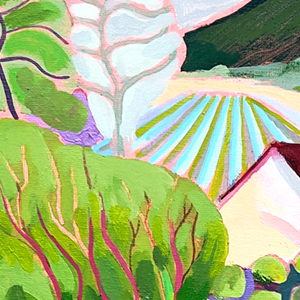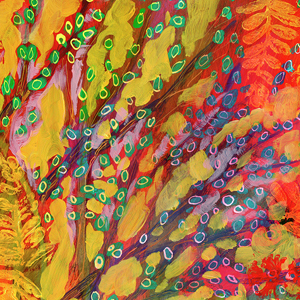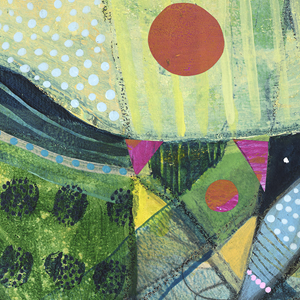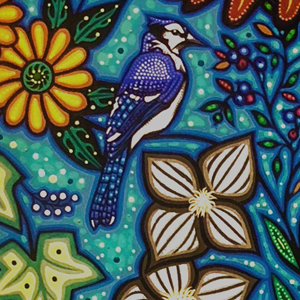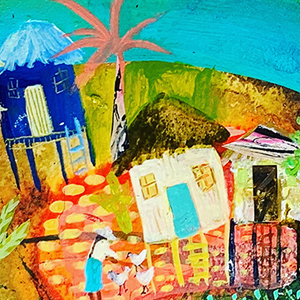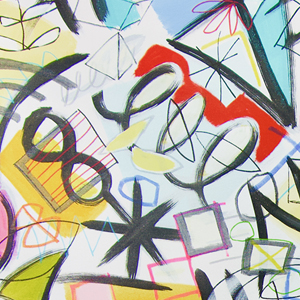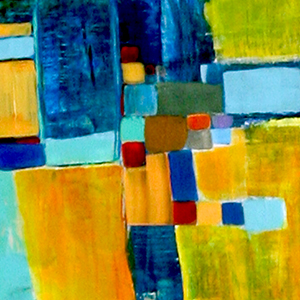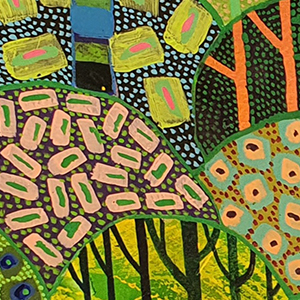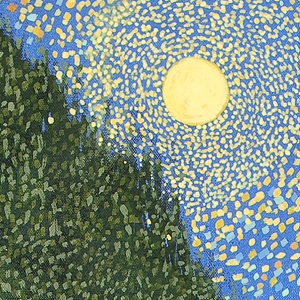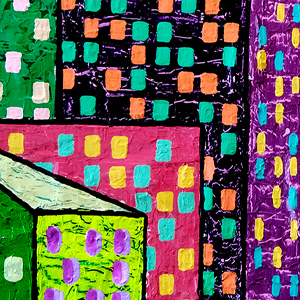
Good Agriculture
Generosity and Scarcity
Field Notes from a Farmer
Jack Bell
Artwork: “Belgrave” by Anna Blatman © 2016
In a recent book, two historians, Fredrik Albritton Jonsson and Carl Wennerlind, trace the emergence of the concept of scarcity in modern theories of economic growth. According to these theories, it’s part of human nature to want to customize our needs and wants endlessly. When the basic needs of food, clothing, and shelter are met, we move on to other needs and wants. Left unchecked, human desire is infinite—“absolutely insatiable,” William Stanley Jevons, one of the early pioneers of this movement, wrote.1 However, rather than being a moral vice in need of virtuous correction, insatiable desire was thought to be “the great spring of human action” in economic development.2 A revolution in the theory of exchange value followed. Insatiability meant that “subjective valuation,” not labor, is the final determinant of a commodity’s value on the market. “Value depends entirely upon utility,” Jevons wrote, and not the workers’ labor that was poured into the commodity before it was made available to the marketplace.3
If human desire is insatiable, everything in the world is potentially desirable by human beings. And if everything is desirable, then the earth’s resources should be treated as scarce. Jonsson and Wennerlind call this concept of scarcity “neoliberal scarcity.” What’s striking about it is that, instead of treating scarcity as a temporary condition that results from greed, resource mismanagement, or blunder, scarcity is extended to every existing resource on the planet. Even what I own and do not wish to consume is scarce, because it represents something I could sell or trade on the open market. According to Léon Walras, another early proponent of neoliberal scarcity, the condition of possession without consumption assures me of a “double advantage” as an economic agent.4 Not only am I assured of a stock of resources I might need in the future; that stock represents an “unwanted remainder” that might be useful in procuring things that, in the future, I decide that I need.5 Thus, “no portion [of our wealth] could be given up without causing a sacrifice of want-satisfaction.”6
At first blush, neoliberal scarcity makes life resemble Hobbes’s description of human beings in a state of nature: “a war of all against all.” However, the architects of neoliberal scarcity, many of whom are past winners of the Nobel Prize in economics, argued precisely the opposite. If consumers and firms acted in their best interest, which invariably meant their own private interest, society would be organized optimally around the happiness of all. Human desire might be insatiable, but with the ministrations of science and technology, the resources of the natural world might be extended indefinitely into the future. Human society might even be able to transcend its organic and biological limits. For the architects of neoliberal scarcity, Jonsson and Wennerlind write, “nature was an infinite treasure, the fruits of which could be continuously harvested as long as people kept cultivating their imagination and promoted the advancement of scientific knowledge. With a never-ending series of improvements in knowledge, all environmental obstacles of economic growth would be transcended, and the economy could continue to grow, ad infinitum.”7
For several decades, this prophecy seemed to come true. In the second half of the twentieth century, proponents of neoliberal scarcity helped foment a burst of unprecedented economic growth around the world. In 1970, one half of the global population lived in extreme poverty. Today, that figure is one tenth.8 In the same time span, the global economy has grown twenty-six times bigger. Cheap fossil fuels have enabled societies around the globe to industrialize. At the center of this growth story lies a key innovation in industrial agriculture. Synthetic fertilizers enabled farmers to increase crop yields 30 to 50 percent per year. In response, populations, cities, and life spans exploded. Some estimates suggest that the global population would never have reached beyond 3.5 billion without it. “Put another way,” Jonsson and Wennerlind write, “to produce the agricultural output levels achieved by the year 2000 would have required four times as much land.”9
And yet, if scientists and ecologists are correct, nature has proven to be anything but an “infinite treasure.” There is a deadly irony that runs through the last fifty years of the growth story. The same economic patterns that brought prosperity and a better life to billions of people suddenly threatens to topple the biosphere of the entire planet. The literature on anthropogenic climate change is vast and complex; I wish only to highlight the reality that climate change has pushed industrial agricultural systems, the backbone of economic growth and globalization, beyond the breaking point. Rising CO2 levels have made staple crops like corn, wheat, and soy produce less food. (Studies suggest that it is also less nutritious.)10 In regions that are essential to feeding the global population, crop yields are expected to decline rapidly in the coming years. Scientists at NASA predict that globally, by 2030, maize (corn) yields will fall by 24%. Wheat will fall by 17%.11 The cumulative effect of such losses will be catastrophic.
To feed more people, we need more cropland. But studies suggest that land clearance already contributes anywhere from 12 to 20% of all global greenhouse gas emissions year to year. At the same time, cropland conversion has triggered huge losses in biodiversity. Biologists say we are living through a sixth mass extinction event. One in three species on earth is currently in danger of being lost forever. We are only now beginning to reckon with the human consequences of such loss. In the words of one paper published recently in The Lancet, one of the most important academic medical journals in the world, the COVID-19 pandemic was “intimately linked” with the decline in global biodiversity.12
Conversations about environmental justice often assume that human beings should come to terms with what they owe the natural world for the decades of global prosperity that we’ve enjoyed. But do we really know how to measure ecological debt? And if we could know, are we sure we could pay it back? As a species, our debts are incalculable, lost to time and to an extinction crisis whose end is nowhere in sight. Perhaps it’s pure hubris to suppose that we can tabulate nature’s due. Maybe the virtue of generosity, not justice, offers a more sensible framework for thinking about how to approach our relationship with a world that human prosperity has ravaged. Creation, both human and non-human, teeters on the brink. Shouldn’t we respond with everything we have and try to reverse course?
Aristotle wrote that the generous person knows what to give at the right time to the right people. When the right opportunity comes, he parts with what he has, regardless of whether he knows or loves the recipient. Aquinas calls this virtue liberalitas; it means to be free, or loose, with one’s money. But the virtue also requires good judgment (Aquinas says generosity “belongs” to prudence), a knack for when to part with a portion of your wealth and when not to. It doesn’t matter whether you have large sums to give. What matters is that, when the right occasion presents itself, you part with an amount that marries what you have with the size of the need.
Modern forms of giving tend to distort the virtue of generosity by decoupling the act of giving from the social context that makes giving make moral sense. For example, it’s estimated that one trillion dollars are held by private, non-profit foundations in the US. Most of the wealth of these institutions was donated to them, at least originally. By donating wealth to private foundations, many of which they retain control over, wealthy people reap enormous breaks in income tax, estate tax, gift tax, and capital gains tax. When ordinary people give, it tends to be seen as an expression of value. So-and-so cares about the environment; therefore, they donate a portion of their wealth in order to promote conservation, the fight against climate change, or the development of clean energy.
However, it’s not obvious what any of these gifts has to do with virtue. If I materially benefit from giving my money away, then I’m just conducting business, not being generous. For the virtue to work correctly, I can’t love what I own or desire to get more of it. And I can’t expect to be able to control how the money gets used. That’s why Aristotle thought it was impossible for the generous person to remain rich. Generosity requires you to relinquish control of your money to other people. It’s easier, Aristotle says, for the wasteful person to become generous than it is for the rich. The wasteful person is already used to giving away what he has. Once he experiences poverty or old age, his giving usually becomes more responsible. Even then, it’s extremely difficult for him to become rich.
“Liberality,” Aquinas wrote, “arises from a person being affected in a certain way towards money, such that he desires it not nor loves it.”13 In other words, generosity bubbles up naturally from a state of emotional detachment from one’s possessions. As long as our desire for possessions is insatiable, we will never be generous. Achieving this state of detachment is no mean feat. Augustine once said that “what we do not have can be refused, like food. To renounce what we already own, is like amputating parts of one’s own body.”14 It takes an extraordinary level of self-mastery to sever the emotional bonds to your wealth. It probably can’t be done without a community of people around you to help you do it. I am reminded of what Peter Maurin, one of the founders of the Catholic Worker Movement, once said: that the point of living in community with others was to make it easier for everyone to be good. Perhaps we need new social forms to allow the virtue of generosity to flourish again. But we also need the old ones—churches, intentional communities, monasteries—to show us that another way is possible.
But what does this understanding of generosity have to do with natural world? And how could it help us in our effort to repair it? Aristotle and Aquinas both thought that generosity took wealth, and wealth alone, as its object. When we are generous with things that aren’t money, we are still valuing those things for the monetary value they hold. However, as early Christian thinkers like Augustine observed, the Latin word for money, pecunia, comes from pecus or pecora, which means flocks of sheep (or goats). Money is a modern, unnatural convenience, they thought; it has the effect of distorting the real value of people and of nature. This etymology runs parallel to the history of the word generosity. Generosity comes from generositas. In the Middle Ages, if you had generositas, it meant you belonged to the nobility. In a feudal society, gift giving enabled nobility to solidify and strengthen bonds across social groups. But the word generositas comes from the Latin genus or genera, which means natural “kind” or “kinds (of things).”
Curiously, both etymologies gesture to the objects that money eventually was supposed to stand for, not the money or the act of giving away money. The words point backwards to a world not yet dominated by the logic of scarcity and monetization. I want to ask: could they also point us forward? Marx spoke of the mystical character of the modern commodity. The monetary value of objects, when they are bought and sold on the marketplace, bears no straightforward relationship to the nature of the objects themselves. Placing things for sale on the market and assigning them an exchange value obscures their real value. In a similar vein, Karl Polanyi argued that to extend the commodity form to land makes land a fictitious commodity. Land is nothing if not creation, in all its splendor, intricacy, and beauty that we have so terribly marred. To view it as a scarce resource is to see only a small, shriveled fragment of what it really is or could be. It also denies us the possibility of a relationship with it.
If most of us choose to be generous to the natural world, we will likely do so by donating to a cause that is backed by a not-for-profit institution. These institutions support necessary work. But allow me a moment to implore those who are bodily able to be generous with their hands and their feet. You are a creature with a body that came from the earth. Learn to care for the earth you live on. Find out who lived there before you did. Plant native trees in your yard; tend a garden; learn to care for it without herbicides, pesticides, and synthetic fertilizers. If virtue really is its own reward, so too is generosity to nature. Even if you never farm professionally, keep at it and your life will begin to take an earthly, tactile shape that no other vocation can replicate.
On the farm, my relationship to living organisms toggles between the perspectives of land stewardship and finance. How do I care for this place and the multitude of creatures who live here: the microscopic and the macroscopic ones; the human and non-human, the wild and domesticated? But also: how will I make money? In an ideal world, these two spheres of responsibility overlap as much as possible. In refusing to treat the land as a bundle of scarce resources to be lorded over, I still must find a way to turn a profit. It’s not an exaggeration to say that the future of sustainable and regenerative agriculture banks on this hope. In the real world, though, most daily chores don’t generate money in any direct way. I am not a particularly gifted business person. Most often, money enters my mind like an afterthought. I have run out of grass for these cows and I need to sell some; there are more lambs than I can count, and I am afraid they will breed back and make even more lambs; or the bumper crop of broccoli will soon bolt and no longer be edible; or—worst of all—I have an unexpected bill coming due, and I need to liquidate an asset.
Such moments are frequently painful. But more often than not, the pain comes from severing the relationship I have with the animals and plants I have spent years of my life caring for. It’s painful to part with them not because they are an extension of my wealth or my “financial security,” but because I have cared for them through (sometimes) countless acts of daily attention and care. To move beyond a world dominated by the logic of scarcity and the insatiability of desire, we desperately need new ways of conceiving the relationship between nature and the economy. How are we to do that without our boots on the ground?
Notes
- Carl Wennerlind and Fredrik Albritton Jonsson, Scarcity: A History from the Origins of Capitalism to the Climate Crisis (Cambridge, MA: Harvard University Press, 2023), 183.
- Ibid.
- Ibid.
- Ibid., 184.
- Ibid.
- Ibid.
- Ibid, 199.
- My figures come from the recent review essay: Idrees Kahloon, “The World Keeps Getting Richer. Some People Are Worried,” The New Yorker, May 27, 2024, newyorker.com/magazine/2024/06/03/growth-a-history-and-a-reckoning-daniel-susskind-book-review.
- Scarcity, 176.
- Samuel S. Myers, et al., “Rising CO2 Threatens Human Nutrition,” Nature 501 (7503) (2014): 139–42; doi.org/10.1038/nature13179.
- Jonas Jagermyer, et al., “Climate Impacts on Global Agriculture Emerge Earlier in New Generation of Climate and Crop Models,” Nature Food 2 (2021): 873–885; doi.org/10.1038/s43016-021-00400-y.
- Odette K. Lawler, et al., “The COVID-19 Pandemic Is Intricately Linked to Biodiversity Loss and Ecosystem Health,” The Lancet 5 (11) (2021): thelancet.com/journals/lanplh/article/PIIS2542-5196(21)00258-8/fulltext; doi.org/10.1016/S2542-5196(21)00258-8.
- Summa Theologica (Notre Dame, IN: Ave Maria Press, 1948), IIa–IIae, q. 117, a. 5, ad 3, p. 1678.
- Quoted in Peter Brown, Through the Eye of a Needle: Wealth, the Fall of Rome, and the Making of Christianity in the West, 350–550 AD (Princeton University Press, 2012), 184.
 Jack Bell farms and writes in the Carolina Piedmont. He has taught English literature at Duke, Wake Forest, and the University of Richmond. You may find more of his writing at bellfarm.substack.com.
Jack Bell farms and writes in the Carolina Piedmont. He has taught English literature at Duke, Wake Forest, and the University of Richmond. You may find more of his writing at bellfarm.substack.com.
Fall 2024
Part I: Abundant Virtue
Laurie L. Patton
Sarah A. Schnitker
Patricia Snell Herzog
Melissa Fitzpatrick
Dirk Philipsen
Interlude: Generous Eyes, Radical Love
Fr. Martin Lam Nguyen, CSC
Part II: Abundant Vocation
MORE





